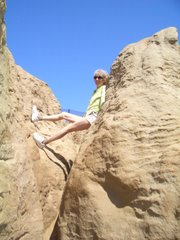
EGBERT Ch. 10. Teacher DevelopmentRICHARDSON Ch. 7. Fun with Flickr: Creating, Publishing, and Using Images Online
We've talked a lot in class about how technology can be used to help ELLs learn English. The internet is also an excellent resource for teacher professional development.
- Describe ways you have used internet resources for your own professional development as a language teacher.
- If you haven't already done this, describe some of the resources in the Egbert chapter you would be interested in trying.
- Next, briefly describe how images such as those from Flickr and other free photo sharing sites can be used in ESL classrooms.
I entered UTSA in the Fall of 2006. In addition to classes, I have jobs in three areas concerning usage of English: 1) teaching communications skills to Junior and Senior Engineering majors, 2) Proofreading compositions from both students and faculty, and 3)language consultation and coaching, mostly on articulation.
Internet resources and the readings, especially the newest in teaching approaches via Cummins, have stimulated me to reconsider my whole approach to teaching! I have come to realize the need for and power of "TV" like resources to grab the attention of the students, and then to intervene using questions to get them to help construct an opinion. This is more difficult with engineers than with other majors, as so much of their training is via transmission. For example, I plan to use YouTube more to ask what they think of the effectiveness and appropriateness of different styles of presentations. Grammatical corrections present more of a problem, as eyes glaze over at the mention of the word grammar, and I read their thoughts about this not being part of engineering. Websites (and Engineering websites or blogs--thanks Dr. Wright!) containing texts to be upgraded from colloquial language to engineering/scientific language can be used to get them to become aware and eventually make the upgrades to their writing. This obviates the need to preach to them about possessives, subject/verb agreement, etc. and offers a fresh incentive to use the constructivist approach to learning.
In proofreading, questions always come up about why the need for a certain preposition or the use of articles. As we all know, these elements are some of the most difficult to explain as there are few rules, and there seem to be more exceptions than rules. Web searches yield information regarding some of the rules, and having these handy (printed out) when certain questions come up, I can at least document a certain usage. However, nothing time-consuming or laborious is appropriate, as these individuals have very little time to concentrate on language vs. their academic subject matter.
In consulting work, both in Germany and in the US, articulation of certain sounds and syllable stress occurs as an issue amongst many clients. I have found that the Audiograms made of the client's spoken work via Audacity, in ca. 30 second segments, is most effective for review and discussion. This is the ultimate in AUTHENTIC input/output. In some cases, the phonetics websites are helpful, such as http://www.uiowa.edu/~acadtech/phonetics/
The wealth of materials throughout Egbert is overwhelming and will take some time to be digested. In Chapter Ten, the most seemingly useful sites, also excellently presented in class, are: EnglishClub.com (http://grammar.englishclub.com , Purdue's Online Writing Lab, and Languageand Linguistics: TESOL. These resources are for both L2 and L1! students.
The photos from Flickr are of high quality in many cases, and can be used to produce an attention-grabbing slide show, for example, via PhotoStory. In my case, a slide show or photos to lighten-up the atmosphere (funny pictures of people presenting) or to symbolize a state of mind--a beautiful scene associated with balance and confidence, for example, are unexpected and fun for the Engineers.


1 comment:
Hi Carol,
I love your enthusiasm! I'm thrilled to know some of your perspectives have changed, and you've gained new ones from this class! The engineering dept. is lucky to have you.
I encourage you to take the Advanced Literacy course next time it is offered. You'll find it goes along well with the editing work you're doing with engineering faculty and staff.
-Dr. Wright
Post a Comment